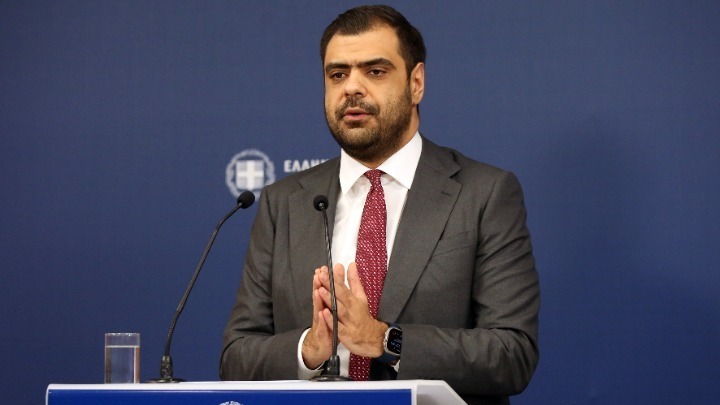Marinakis: Significant decline and favourable prospects for Greece's public debt

Government spokesperson Pavlos Marinakis, while briefing the press on Thursday, stated that Greece's public debt has recorded a significant decline, "which is not only sustainable but also presents a better prospect than that of other eurozone countries, as it has more favourable servicing terms in comparison with that of Germany or other member-states."
As Marinakis explained, Greece's debt "has a fixed and predictable servicing rate of 1.73% for its entire term until maturity. Economy and Finance Minister Kyriakos Pierrakakis announced that a significant part of the public debt, about 31.6 billion euros, will be repaid early, by 2031, a decade earlier than it normally mature. Specifically with regard to the current year, in December 2025 the Greek state will make a further early repayment of the memorandum loan of at least 5.29 billion euros, with this amount covering loans maturing from 2033 until 2041. Early debt repayment is a strategic choice of the government, which leads to multiple benefits for the Greek economy, as it regains the confidence of the markets, sending a clear message to the rating agencies and the international investment community that we are acting with foresight, and reduces the annual interest payments on servicing loans and boosts growth."
Marinakis also announced that Prime Minister Kyriakos Mitsotakis is to visit Heraklion, Crete, on Friday to address an event on the signing of the construction contract of the north road axis of Crete (BOAK) that links Heraklion with Chania.
On Monday, 12 May, Mitsotakis will visit Rome, where he will meet with the Prime Minister of Italy Georgia Meloni. After the meeting, there will be a meeting of the Greece-Italy High-level Cooperation Council.
"Greece and Italy are two EU member-states with a voice and a role in the European Council on all the major European challenges of the coming period, such as competitiveness, the defence and security of the EU, and migration. At the same time, they are two Mediterranean countries facing common challenges at their external borders, as frontline countries with respect to migration, while they are pillars of stability in the Eastern Mediterranean and the wider region," said Marinakis. He noted that the two prime ministers are expected to discuss this aspect, as well as the prospects for boosting cooperation between the two countries in the EU and on a bilateral level, with emphasis on the economy, connectivity, energy, civil protection and transport.

















































































